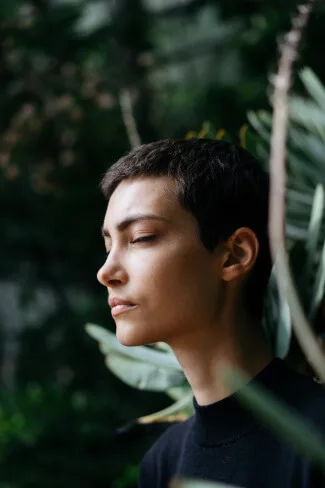If you’ve ever tried meditation, you may have wondered, why does meditation make me sleepy? And is this a good or bad thing?
Table of Contents

Hi, Ian here and welcome to this article!
Ever sat down for a blissful mindfulness session, only to find yourself eyelids heavy, head nodding, and dreamscape visions blooming behind your closed lids?
Don’t worry, you’re not alone. The question “Why does meditation make me sleepy?” is practically as ancient as the practice itself.
Think of it this way: your mind’s like a hummingbird with a caffeine addiction. It’s constantly buzzing, flitting from thought to thought, sipping nectar from worry flowers and anxiety buds. Meditation, bless its heart, tries to be the chill spa music to your hummingbird’s frenetic flapping. It whispers, “Slow down, little guy. Smell the mindfulness roses.” And guess what? Sometimes, that lullaby works a little too well.
But before you ditch your meditation cushion for a nap nook, consider this: sleepiness during meditation isn’t always a bad thing. Research suggests (check out the peeps at UCLA, they’re smart cookies) that certain meditation styles trigger brainwaves similar to light sleep. This, it turns out, can be pretty darn beneficial. It’s like your brain’s taking a mini-vacation, decluttering the mental attic, and letting you recharge for round two of life’s juggling act.
So, what does this mean for you, oh sleepy meditator? Well, if occasional drowsiness doesn’t disrupt your practice, embrace it! It’s your brain having a mindfulness fiesta. But if drowsiness turns into full-blown slumber parties every time you try to meditate, fret not. We’ve got some tips to keep your eyelids peeled and your mind present.
Remember, meditation is a journey, not a destination. And like any good road trip, there will be bumps, detours, and maybe even a few unintended naps. But trust me, the view from the peak of mindfulness is worth it. So buckle up, grab your metaphorical thermos of awareness, and let’s explore the fascinating world of sleepy meditation together!
In this article, we will explore the reasons why meditation can cause drowsiness and what you can do to stay alert during your practice.
There are a few potential reasons why meditation might make you feel sleepy. One possibility is that during meditation, your mind settles down and becomes still, and this may lead to a feeling of sleepiness. Additionally, many people find that after they meditate, they feel more relaxed and calm, which can also contribute to feelings of sleepiness.
Finally, if you’re not used to meditating regularly, the experience of sitting still for an extended period may make you drowsy.
Feeling Sleepy After Meditation
Are you finding that you’re feeling sleepy after your meditation sessions? If so, don’t worry – you’re not alone! Many people feel tired after meditating, and there are a few reasons why this might happen. Here, we will take a look at some of the most common causes of fatigue after meditation, as well as some tips for overcoming them. So keep reading to learn more!
It may be that you have been sitting in one position for an extended period, and your body has had a chance to relax. This is a natural response and usually dissipates after a short time. Another reason is that if you’re new to meditation, your mind may be overwhelmed with all the new thoughts and sensations it’s experiencing.
In this case, it’s normal to feel tired as your brain processes all this information. If you’re practicing mindfulness meditation, you may be simply becoming more aware of the things that typically go unnoticed in everyday life. This can be tiring at first, but over time it becomes less draining
Is It Bad To Fall Asleep While Meditating?
We all know the importance of a good night’s sleep. What you might not know, however, is that sleeping during your meditation practice can be just as beneficial. In fact, some people find it helpful to fall asleep while meditating to get the most out of their session.
So don’t worry if you find yourself nodding off occasionally – it’s perfectly natural and can help you achieve a deeper state of relaxation. Just make sure you’re getting enough restful sleep overall so that your body and mind can reap the full benefits of your practice. On the other hand, if you are meditating for a specific outcome falling asleep can defeat the purpose of meditating.
If you’re meditating for a specific outcome, you want to be completely focused on your breath and your thoughts. If you’re falling asleep, then you’re not paying attention to what’s going on in your mind and you’re not getting the full benefits of meditation.
That said, if you find yourself falling asleep during meditation, don’t worry about it. Just make a note of it and try to be more alert during your next session. If you find that you can’t stay awake during meditation, then try doing it at a different time of day or try a different type of meditation practice.

Does Meditation Still Work If You Fall Asleep
Despite the stereotype of the Zen monk sitting in the perfect lotus position for hours on end, meditating for hours at a time is not a requirement to achieve the benefits of this practice. Even if you fall asleep while meditating, you will still reap the rewards. So don’t let worries about sticking to a strict routine keep you from giving it a try.
Meditation is still effective even if you fall asleep. The point of meditation is to focus on your breath and clear your mind, and even if you doze off, you’ll still reap the benefits. Sometimes it’s easier to fall asleep during meditation because you’re in a calm and relaxed state.
Meditation is a great way to reduce stress and improve your overall well-being. It’s been shown to help with anxiety, depression, pain relief, and more. So don’t worry if you fall asleep during your next meditation session – it’s still worth doing!
Am I Meditating Or Sleeping?
It’s easy to get lost in thought while you’re meditating. You might yawn when you meditate, and find your mind wandering off to different places, and before you know it, you’ve been caught up in a daydream. While this isn’t necessarily a bad thing, it can be easy to mistake this for sleeping if you’re not careful.
If you start noticing that you’re regularly dozing off during your meditation sessions, there are some simple things you can do to stay more alert. First, make sure that you’re sitting in a comfortable position and aren’t too stiff. You may also want to try focusing on your breath or a mantra to keep yourself more engaged. If all else fails, simply take a break from meditating until you feel more awake.
One key difference between meditation and sleep is that during meditation, the person remains aware and alert, while during sleep, the person generally enters into a deep state of unconsciousness.
In other words, when you’re meditating, you’re still resting your mind and body but you’re also keeping yourself aware and in control; whereas when you’re sleeping, you’re essentially shutting down mentally and physically.
Having said that, there is some overlap between meditation and sleep states; for example, both activities can involve deep relaxation and a sense of calmness.
Tips For Staying Awake During Your Meditation Practice
If you’re like most people, staying awake during your meditation practice can be a challenge. Here are some tips on how to overcome sleepiness during meditation, and help you stay alert and focused.
First, make sure you’re well-hydrated and have recently eaten a light snack. Try to find a comfortable place to sit or recline, and focus on your breath as you inhale and exhale. If your mind starts to wander, simply bring your attention back to your breath.
One of the most common issues people face when starting to practice meditation is staying awake. It can be difficult to focus on your breath or mantra when your eyes are fighting to stay open and you’re struggling to keep your mind from wandering so:
- Make sure you’re well-rested before sitting down to meditate. If you’re feeling tired, it will be much more difficult to focus and stay awake
- Find a comfortable position that supports good posture. Slouching will only make you more tired and less inclined to stay awake
- Keep your spine straight, but don’t force it

How To Fall Asleep Quickly After Meditating
If you’re like most people, falling asleep after meditating can be difficult. While it’s a good thing to be able to clear your mind and relax, sometimes your body just wants to sleep. Luckily, there are a few things you can do to help yourself fall asleep quickly after meditating. Check out the tips below!
- One is to make sure that you’re relaxed before you try to sleep. If you find that your mind is still racing after meditating, take a hot bath, or read a book until you feel tired
- Make sure your sleeping environment is dark, quiet, and cool, and avoid using electronic devices in bed
- Finally, practice some relaxation techniques before bedtime such as deep breathing or visualization
The Different Types Of Sleep And How Meditation Can Help Improve Your Quality Of Sleep
Sleep is more than just an inactive state. There are different types of sleep, and each one benefits us in different ways. Here, we will explore the different types of sleep and how meditation can help improve your quality of sleep.
There are five different types of sleep:
- Rapid Eye Movement (REM)
- Non-Rapid Eye Movement (NREM) 1, 2 and 3
- Slow Wave Sleep (SWS)
Each type of sleep has its benefits for the body and mind.
REM sleep has intense brain activity. You experience vivid and active dreams. This type of sleep refreshes your mind and is beneficial to your memory and learning.
Non-Rapid Eye Movement (NREM) Phase 1. The initial stage of this cycle is a shift in duration between wakefulness and sleep.
Non-Rapid Eye Movement (NREM) Phase 2 lasts from about 30 to 60 minutes. Throughout this phase, your muscle mass becomes more relaxed and you might start to experience slow-wave (delta) brain activity.
Non-Rapid Eye Movement (NREM) Stage 3. Deep, slow brain waves known as delta waves start to build throughout NREM phase 3 sleep—This phase is also known as delta sleep. This is a duration of deep rest where any noises in the environment might not awaken the sleeper.
Slow Wave Sleep (SWS) is the deepest phase of rest, and it’s throughout this phase that the body repairs and regenerates cells.
Meditation can help improve the quality of your Slow Wave Sleep by slowing down your thoughts and helping you to relax. This will allow your body to get the most out of its overnight repairs.
FAQ
How do I overcome sleepiness during meditation
Practice away from meals.
Practice away from the bedroom.
Create a designated meditation space.
Practice outside.
Stand or walk while you meditate.
Why do I get sleepy when I meditate?
Here are some reasons why you might get sleepy when you meditate. One reason is that meditation can help to relax the body and mind, which can make you feel tired. Additionally, meditation can help to slow down your breathing and heart rate, which can also lead to drowsiness. Finally, if you are meditating in a quiet and dark place, this can also make you feel sleepy.
What can I do to prevent myself from getting sleepy when I meditate?
There are a few things you can do to prevent yourself from getting sleepy when you meditate. First, make sure that you are well-rested before you meditate. If you are tired, you are more likely to fall asleep. Second, try meditating in a bright and airy space. This will help to keep you alert. Finally, try meditating for shorter periods, such as 5 or 10 minutes. If you find yourself getting sleepy, take a short break and then come back to your meditation.
Final Words
Meditation is a great way to relax and reduce stress, but it can also make you sleepy. This is because meditation can slow down your heart rate and breathing, which can make you feel tired. If you find yourself falling asleep during meditation, there are a few things you can do to stay awake.
- First, make sure you are getting enough sleep at night. If you are sleep-deprived, you are more likely to fall asleep during meditation.
- Second, try meditating in a well-lit room. Darkness can also make you feel sleepy.
- Third, avoid meditating right before bed. This will help you avoid associating meditation with sleep.
- Finally, if you still find yourself falling asleep during meditation, try meditating for shorter periods. As you get more used to meditation, you will be able to meditate for longer periods without feeling sleepy.
If you are still having trouble staying awake during meditation, talk to your doctor. There may be an underlying medical condition that is causing you to feel sleepy.
We’ve looked at the different ways meditation can help improve our quality of sleep. From reducing stress and anxiety levels to improving our focus and attention span to helping us understand the different types of sleep. Meditation has a lot to offer those who want to get a better night’s rest and even if you doze off during your meditation practice, don’t worry – it’s still working.
You may find that you sleep more deeply and for a longer duration following your meditation session. If you want to make sure you get the most out of your practice, follow our tips for staying awake during meditation.
And finally, remember that everyone falls asleep sometimes – there’s no need to feel guilty! Just relax into your slumber and enjoy the benefits of a good night’s sleep after some peaceful meditation. And don’t forget that consistency is key when it comes to getting the most out of your meditation practice – so make sure you set aside time for it every day!
Wishing you Health, Wealth, and Happiness
